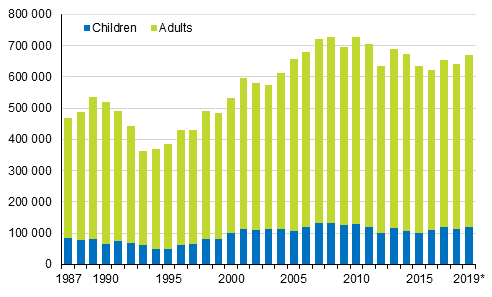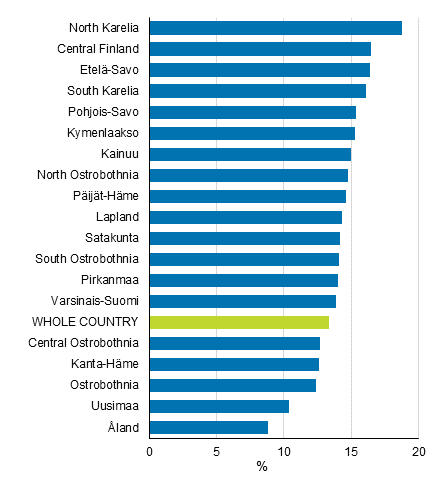Published: 18 December 2020
Number of persons at risk of poverty grew in 2019
The preliminary data of Statistics Finland's income distribution statistics sample indicate that the number of persons belonging to households at risk of poverty was 669,000 in 2019. The share of persons at risk of poverty in the household population was 12.3 per cent, which is 0.5 percentage points more than in the previous year. Then the number of persons belonging to households at risk of poverty was 640,000.
Number of adults and children at risk of poverty in Finland in 1987 to 2019*.

Source: Income distribution statistics’ sample data. Income concept: equivalent disposable money income (excl. capital gains). The data concerning 2019 are preliminary.
The relative risk of poverty has varied in the past ten years between 623,000 and 728,000 persons, when the used at-risk-of-poverty threshold is 60 per cent of median income. In 2019, the at-risk-of-poverty threshold was EUR 15,330 per year for one-person households, that is, around EUR 1,280 per month.
Risk-of-poverty indicator describes the relative income differentials of medium-income and low-income groups, so the development of persons at risk of poverty depends not only on the income development of low-income households, but also on the development of median income. Persons are classified as being at-risk-of-poverty when the household's disposable monetary income per consumption unit 1) is below 60 per cent of the national median income. Households’ median income from which the at-risk-of-poverty threshold is counted, was EUR 25,550 for a one-person household in 2019.
The at-risk-of-poverty figures calculated on the basis of sample data are internationally comparable and they can be compared with, for example, the at-risk-of-poverty data released on Eurostat's website.
Share of persons at risk of poverty is highest in North Karelia, lowest in Åland
The share of persons at risk of poverty is highest in North Karelia, where 18.8 per cent of the population were at risk of poverty in 2019. The share of persons at risk of poverty was lowest in Åland, 8.8 per cent. In addition to Åland, the at-risk-of-poverty rates were lower than the risk-of-poverty rate for the whole country in Uusimaa, Ostrobothnia, Kanta-Häme and Central Ostrobothnia. At-risk-of-poverty data by municipality, region and sub-regional unit are available in database tables .
At risk of poverty rate in dwelling population by region 2019. Data are final.

Source: Income distribution statistics’ total data.
Data describing at risk of poverty by area have been produced on the basis of fully register-based total data of the income distribution statistics. The total data describe the dwelling population, but the income earning unit is a household-dwelling unit rather than a household and the income concept differs slightly from the above-mentioned sample-based definitions that comply with international standards.
The number of persons at risk of poverty and the at-risk-of-poverty rate calculated from the total data are somewhat higher than those calculated from the sample data. In describing at risk of poverty on a detailed area level or of small population groups the total data are, however, the best national data source, as there are no uncertainties related to sample statistics.
1) The consumption units are based on the so-called OECD's modified scale. One adult in the household is one consumption unit. Other persons in the household aged at least 14 each are 0.5 consumption units and children aged 0 to 13 each are 0.3 consumption units. A household with one adult member is one consumption unit, while a household consisting of spouses and one child aged under 14 together are 1.8 consumption units.
Source: Income Distribution Statistics 2019, Statistics Finland
Inquiries: Kaisa-Mari Okkonen 029 551 3408
Head of Department in charge: Hannele Orjala
- Tables
-
Tables in databases
Pick the data you need into tables, view the data as graphs, or download the data for your use.
Appendix tables
Updated 18.12.2020
Official Statistics of Finland (OSF):
Income distribution statistics [e-publication].
ISSN=1799-1331. Income differentials between population subgroups 2019. Helsinki: Statistics Finland [referred: 19.4.2025].
Access method: http://stat.fi/til/tjt/2019/03/tjt_2019_03_2020-12-18_tie_001_en.html

